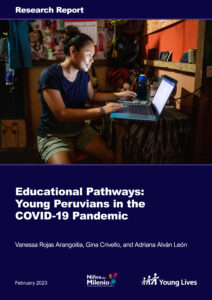Educational pathways: young peruvians in the COVID-19 pandemic
| Año | : | 2023 |
|---|---|---|
| Autor/es | : | Vanessa Rojas, Gina Crivello, Adriana Alván |
| Área/s | : | Pobreza y equidad |
Rojas, V., Crivello, G. & A. Alván (2023). Educational Pathways: Young Peruvians in the COVID-19 Pandemic. Young Lives Research Report.
Young people have suffered most from the economic and social consequences of the COVID-19 pandemic in Latin America. The the pandemic constituted a highly complex scenario in which emergency remote and virtual education emerged as a useful, though not perfect, tool.
This paper presents findings from the second instalment of a telephone follow-up study conducted over two consecutive years, 2020 and 2021, with the Younger Cohort (19- and 20- year-olds) of the qualitative longitudinal Niños del Milenio (Young Lives) study in Peru. This study aims to highlight the changes and continuities in the educational challenges faced by young people in relation to the COVID-19 crisis.
Based on their testimonies, the paper explores the obstacles to their access to education, but above all, factors that appear to be interfering with or jeopardising the continuation of their studies. It also examines the roles played by the state and families, as well as young people’s perception of the low quality of education, in their decisions on whether to continue in higher education. It shows how these young people clearly perceive the negative consequences of prolonged virtual education on their emotional well-being; the specific barriers that only young women perceive – related to traditional gender roles; and the changes in the educational
aspirations of those who were not studying.
This is the translation of a paper first published in Spanish: Rojas, V., Crivello, G. & Alván, A. (2022). Trayectorias educativas: seguimiento a jóvenes peruanos en pandemia [Documento de Investigación, 125]. Lima: GRADE; Niños del Milenio






